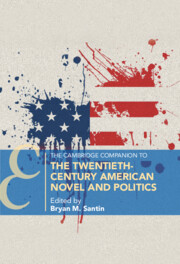Book contents
- The Cambridge Companion to the Twentieth-Century American Novel and Politics
- The Cambridge Companion to the Twentieth-Century American Novel and Politics
- Copyright page
- Dedication
- Contents
- Chronology
- Introduction
- Part I Ideologies and Movements
- Chapter 1 Progressive Liberalism
- Chapter 2 Conservatism
- Chapter 3 Neoliberalism
- Chapter 4 Socialism and Communism
- Chapter 5 Feminisms
- Chapter 6 Sexual Liberation Movements
- Chapter 7 Black Liberation Movements
- Part II The Politics of Genre and Form
- Part III Case Studies
- Further Reading
- Index
- Cambridge Companions To …
Chapter 7 - Black Liberation Movements
from Part I - Ideologies and Movements
Published online by Cambridge University Press: 07 October 2023
- The Cambridge Companion to the Twentieth-Century American Novel and Politics
- The Cambridge Companion to the Twentieth-Century American Novel and Politics
- Copyright page
- Dedication
- Contents
- Chronology
- Introduction
- Part I Ideologies and Movements
- Chapter 1 Progressive Liberalism
- Chapter 2 Conservatism
- Chapter 3 Neoliberalism
- Chapter 4 Socialism and Communism
- Chapter 5 Feminisms
- Chapter 6 Sexual Liberation Movements
- Chapter 7 Black Liberation Movements
- Part II The Politics of Genre and Form
- Part III Case Studies
- Further Reading
- Index
- Cambridge Companions To …
Summary
This chapter explores how the African American novel imagined a better world, experimented with form, and reflected the artistic and cultural sophistication of Black people in the twentieth century. It argues that understanding the twentieth-century African American novel in the context of various overlapping liberation movements helps us organize our thinking about the ways in which writers used long fiction to explore the social, political, ideological, and historical realities that informed the time period in which they were writing. Focusing on African American fiction produced within and around several Black liberation movements and historical interregnums – i.e., Post-Reconstruction, the Harlem Renaissance, the Black Arts Movement (BAM), and the post-BAM Toni Morrison era – the chapter examines the nuances and complexities of novelists who used the novel as form to reflect and inspire shared visions of a liberated future.
Keywords
- Type
- Chapter
- Information
- Publisher: Cambridge University PressPrint publication year: 2023

